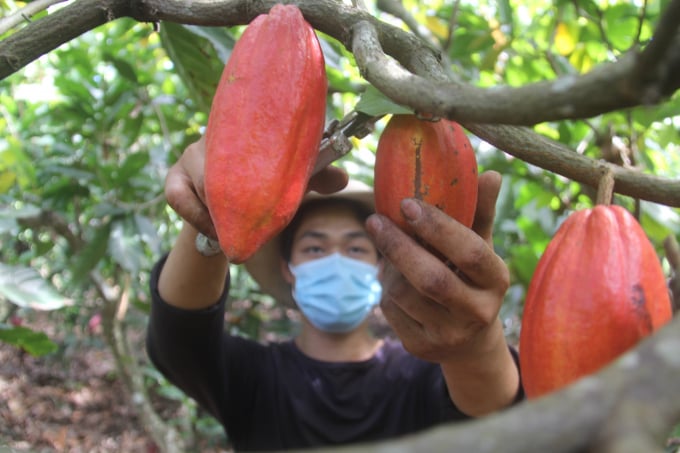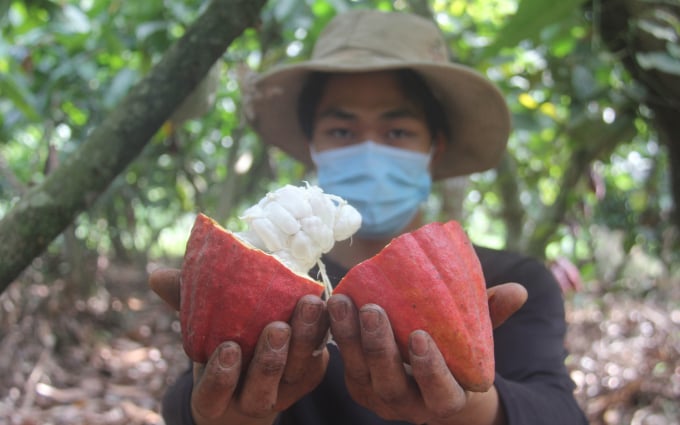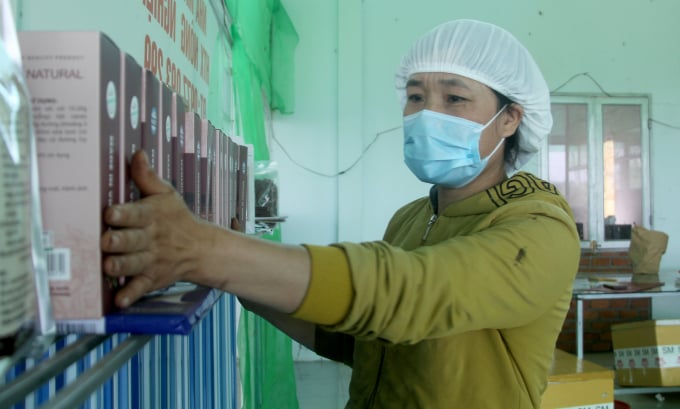May 30, 2025 | 11:37 GMT +7
May 30, 2025 | 11:37 GMT +7
Hotline: 0913.378.918
May 30, 2025 | 11:37 GMT +7
Hotline: 0913.378.918
Mr. Nghia accomplished his ambition of manufacturing chocolate on the roughest soil in Dak Nong 20 years ago when he tasted the first cup of cocoa brought from overseas by his relatives.
Mr. Vu Van Nghia, a resident of Tan Hop village, Tan Thanh commune, Krong No district, Dak Nong province, is the area's first farmer to collaborate with other farmers to cultivate over 120 ha of cacao and create chocolate on his own.
He showed us the cacao beans that had been carefully harvested and fermented from first-class pods, and now are ready to be used in the process of manufacturing "authentic" chocolate.

Krong No Agricultural Cooperative picks ripe cocoa beans to harvest. Photo: Quang Yen.
The farmer from Nam Dinh moved to Tan Thanh commune in 1995 to plant coffee and was asked to participate in a training program on cacao tree cultivation. He chose to intercrop cocoa plants with coffee trees to conserve space and minimize the dangers associated with experimenting with new plant species.
Mr. Nghia stated that his first objective was to intercrop cocoa to capitalize on unoccupied land and enhance revenue. However, after three years of cultivation, he discovered that cocoa was fairly easy to cultivate and required little attention. The tree bears fruit all year and is harvested in 8-9 months in separate clusters.
Following his first success, he advised farmers in the region to extend their cropping areas. Rather than intercropping, he converted two hectares of coffee plants to cacao plants.

Mr. Nghia said that good chocolate must be produced from first-class cocoa. Photo: Quang Yen.
He planted around 1,000 cocoa trees on each hectare of land. After a few years, the trees tried to enter the harvest crops, with an average yield of 2-2.5 tons of beans per hectare.
"On average, I purchase around 90 tons of cocoa beans each year, with some years reaching almost 150 tons. The majority of it is raw processed and then sold to makers of cocoa powder, vegetable oil, and chocolate; only a little amount is kept for family use," the owner of the chocolate business remembered the time before cacao was taken into deep processing,
Mr. Nghia founded Krong No Agriculture Cooperative in 2016 to assist cocoa farmers with tree care and product production. When the cooperative was continually brought to exhibits and presentations, it developed a brand identity, assisting the area's cocoa goods in maintaining consistent production.
When Mr. Nghia saw that the cocoa consumption chain is too dependent on corporations and organizations. Additionally, the price of raw cocoa against finished cocoa is "As Different As Chalk and Cheese." The director then developed the concept of converting cocoa into commercial items.

Mr. Nghia established a cooperative and associated with people to grow more than 120 hectares of cocoa. Photo: Quang Yen.
"At first, the cooperative produced simply a cocoa powder. However, beginning in January 2021, we imported more machinery to manufacture three additional cocoa products, including 100 percent pure chocolate, 65 percent chocolate, and 40 percent milk chocolate. These are unique chocolate bars that capture the essence of Krong No land, "Mr. Nghia presented himself confidently.
The director of Krong No Agriculture Cooperative emphasized that it is not always possible to resolve issues immediately. Because a good batch of chocolate is the result of several factors, ranging from ingredient selection to deep processing steps.
"Because I am a farmer, rooted from a family of farmers, the way I do things is definitely. I once packaged the goods myself and delivered them to Hanoi for the introduction. No one thought I could manufacture chocolate at first, but after tasting it, hearing my story, and witnessing the cooperative's process firsthand, they quickly believed. Now I've got reliable consumers as well," Mr. Nghia explained.

Chocolate products of Krong No Agricultural Cooperative are about to be put on the market. Photo: Quang Yen.
In 2021, the Krong No Agricultural Cooperative was certified as a three-star OCOP for two cocoa powder and chocolate goods. Since then, the cooperative has been backed by the Krong No district People's Committee with machinery and finances to design, print, and manufacture labels, resulting in the steady development of a brand for cocoa goods.
"With cocoa powder priced between VND 370,000 and VND 600,000 per kg, Mr. Nghia and Agriculture Cooperative Krong No's aim of elevating the value of the cocoa material area is virtually accomplished. My roughly 120-hectare cocoa crop likewise adheres to safe production standards, which benefits both growers and customers. Currently, we are studying ways to include the product into e-commerce platforms to expand its accessibility to customers," the director explained.
Translated by Linh Linh

(VAN) Ms. Nguyen Thi Dung, Deputy Director of Ngoc Hoang Cooperative, shared about the journey of bringing dragon fruit to Europe, achieving annual revenues in the billions of VND.

(VAN) Bamboo products from Thang Tho Bamboo Cooperative have reached many countries around the world, while also creating jobs for local workers.

(VAN) The Management Board of Con Dao National Park reported that a green sea turtle, tagged in the Philippines, has traveled thousands of kilometers to lay 84 eggs on Bay Canh Islet.

(VAN) Green technology is paving a new path for sustainable aquaculture in the Mekong Delta in particular and across the country in general, helping reduce emissions and adapt to climate change.

(VAN) On May 27, La French Tech Vietnam (the French startup and innovation community in Vietnam) held the French Tech Summit Vietnam 2025.
/2025/05/27/4731-2-223159_980.jpg)
(VAN) No votive paper, no styrofoam, no plastic bags, no plastic bottles, and no single-use plastic trays are the key rules tourists should keep in mind when visiting Con Dao.

(VAN) In the fight against plastic pollution, Vietnam has been demonstrating a proactive, pioneering, and active role in addressing the greatest environmental challenge today.